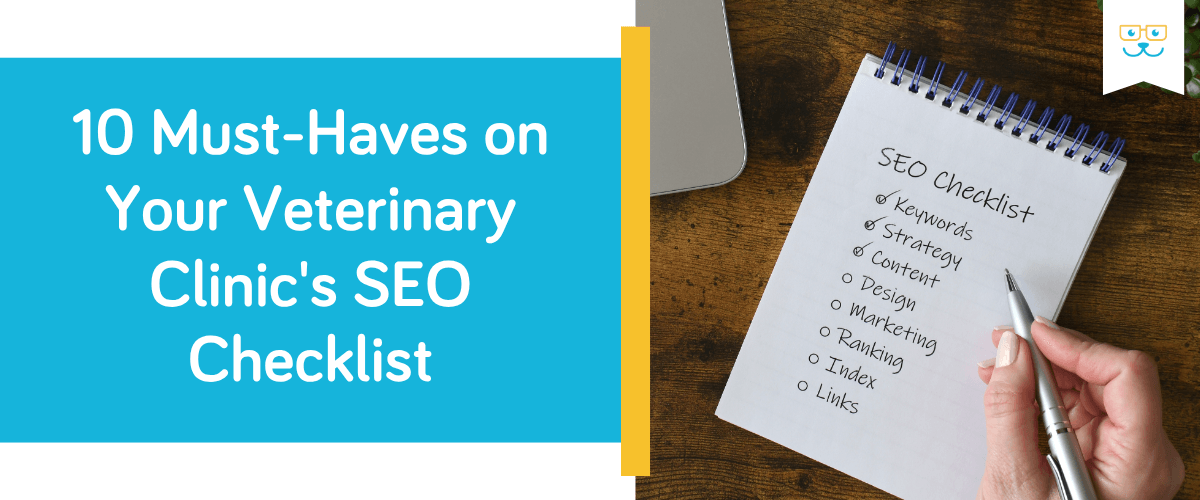10 Must-Haves on Your Veterinary Clinic's SEO Checklist
Pet owners today aren't flipping through phone books to find a veterinarian; they're turning to Google, Siri, and Alexa. Whether they're searching for "veterinarian near me" or asking, "Why is my dog limping?" Your clinic needs to show up in those results. If you're not visible when and where pet parents are searching, you're likely losing potential clients to practices that are.
This is why SEO (Search Engine Optimization) is your key!
But let's face it, most veterinary professionals don't have time to decode every algorithm update or Google trend. You need a reliable, proven SEO checklist that speaks your language, respects your time, and actually works.

Here's your 10-step veterinary SEO checklist to help your clinic get found online and stay top-of-mind with pet parents in your community.
- Target Local Keywords Strategically
Generic terms like "vet clinic" won't cut it. You need to ensure you utilize the full term "veterinarian" and localize your keywords to match how people search. Think:- "Affordable veterinarian in [Your City]"
- "Cat dental care near me"
- "24-hour emergency veterinary clinic in [City]"
- Create SEO-Optimized Service Pages
Each service you offer, like spay/neuter, dental care, senior pet wellness, or flea and tick prevention, should have its own page. This allows Google to serve that page when someone searches for that specific need. Write content that explains the service, outlines benefits, answers FAQs, and includes a call to action.
- Claim and Optimize Your Google Business Profile
This is your clinic's digital front door. Ensure your listing is verified and updated with your correct address, phone number, website, business hours, and services. Upload high-quality photos of your team, facility, and furry patients (with permission). Keep your description keyword-rich with terms like "veterinarian in [City]" or "pet wellness exams."
Want to ensure your business appears in the highly coveted Google Business Profile "local pack?" This map-based listing shows the top three nearby practices when someone searches for a local veterinarian. Check out what our Local Accelerator program entails.
- Make Your Website Mobile-Friendly

More than 60% of searches come from mobile devices. If your site isn't optimized for mobile, meaning it's slow, hard to navigate, or has tiny buttons, you're losing visibility and frustrating potential clients. Google also ranks mobile-friendly websites higher in search results.
- Improve Page Speed and Technical SEO
If your website takes too long to load, potential clients might leave before seeing what you offer, and Google may rank you lower. Some common fixes include changing your image type from a png to a jpeg, condensing the file size through platforms like TinyURL and making sure the pages are organized clearly behind the scenes. A faster, smoother website helps both pet owners and search engines find what they need.
If you are unsure how to determine if your website is running slow or not set up correctly, our team of Veterinary Marketing Experts is happy to review your website with you during a Marketing Health Exam.
- Publish Consistent, Quality Blog Content
Blogging is still one of the most effective ways to boost organic traffic and build trust. Write helpful, engaging posts that answer pet owner questions. Topics like "Why Is My Dog Scratching So Much?" or "How Often Should My Cat Get Vaccinated?" are goldmines for SEO and engagement.
Genius Tip: Looking to write blog posts that rank and convert on Google? Check out our blog post on how to "Stop Writing Fluff and Create Blog Posts That Rank + Convert."
- Help Google Understand Your Website with Special Tags
There's a way to add special "tags" behind the scenes of your website that tell search engines exactly what your pages are about. This is called structured data or "schema." For veterinary clinics, this can include things like your business hours, types of services you offer, or that you're a trusted medical provider. Adding this helps Google show more helpful information in your search listing, like star ratings, hours, or services, which can make your practice stand out and get more clicks.
- Encourage Online Reviews (and Respond to Them)
Search engines reward businesses with high-quality, recent reviews. Encourage happy clients to leave a review after their visit. Be sure to respond to all positive and negative reviews to show your clinic's professionalism and care.

- Build High-Quality Backlinks
Backlinks (links from other websites to yours) are a strong signal to search engines that your content is valuable. Partner with local pet shelters, bloggers, or veterinary associations to share your blog posts or service pages. Backlinks help boost authority and visibility.
- Track Performance and Adjust
You can't improve what you don't measure. Use Google Analytics and Google Search Console to track how people are finding you, which pages are performing well, and what needs improvement. Look for trends in traffic, bounce rates, and top-performing keywords so you can refine your strategy.
SEO Isn't a One-Time Task, It's Ongoing Care
Just like your patients need routine check-ups, your SEO strategy needs consistent attention. But when done right, it can become one of the most effective, sustainable ways to grow your veterinary practice and connect with pet parents in need.
Need expert help implementing this checklist for your clinic?
At GeniusVets, we specialize in veterinary SEO that works, no guesswork or fluff. Book your FREE Marketing Health Exam, and let's make sure your practice is set up to thrive in search.
Book Your Complimentary Marketing Health Exam
Want more tips like this every week?
Subscribe to the GeniusVets Weekly Newsletter and get fresh insights, free resources, and veterinary marketing strategies delivered straight to your inbox.

